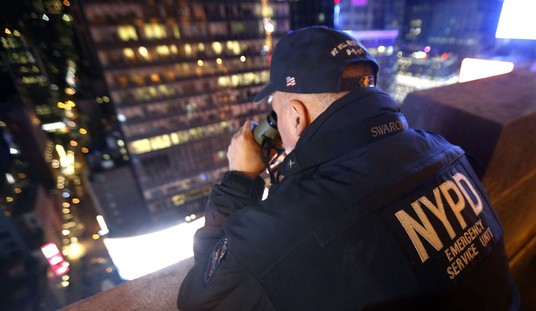Lee Smith describes the slow, but seemingly inexorable departure of Christians from the place of its birth — and its historical homeland. It is nothing less than ethnic cleansing. Worse, it is an ethnic cleansing whose name cannot even be spoken. “Even rhetorical defenses of the Christians are cautious. Pope Benedict, like popes before him, chooses his words carefully when addressing the situation of Middle Eastern Christians, lest they be made to pay for perceived slights.”
Not just in the Middle East, but elsewhere too. When Pope Benedict spoke out against “blasphemy laws” in Pakistan which were used to sentence Christians to death, the Pakistanis — an American ally — were outraged. “The demonstration came days after the Vatican called for Pakistan to repeal the controversial laws that say anyone who defiles the name of the Muslim prophet Mohammed should face the death penalty or life imprisonment.”
“If you challenge the prophet, we will take revenge. It doesn’t matter who does it,” shouted a cleric on loudspeakers to thousands of cheering onlookers. Pakistan’s blasphemy laws came into sharp focus when a security guard allegedly killed his boss Salman Taseer, the governor of Pakistan’s Punjab province, who criticize[d] the laws.
Although “Christian” elites in the West often maintain that identity only for the convenience of being able to denounce themselves, Christians in the region still hope co-religionists from other parts of the world can help ensure their survival. Lee Smith describes an appeal from one Christian leader on political grounds. If the West will not do it for religious reasons, will they not act on on the basis that minorities should be properly represented as a matter of principle?
What they want, he says, is something like a Marshall Plan for Middle East Christians—“Some money to build schools and other programs.” “The United States,” he continues, “can also ensure that Christian minorities are fairly represented in their parliaments. The Copts make up 10 percent of Egypt’s population, and yet there are only 2 or 3 elected Coptic representatives and another few named by the government. The Copts should have at least 40 seats out of the 500-seat parliament. In Iraq, even with only 3 percent of the population the Christians should have 14 members of parliament.” Instead, they have only 2.
Principle? Oh that principle. Probably not, concludes Smith, because that will mean assuming the burden of physically minority groups in societies where protection (in exchange for subservience) is the standard political model. The Middle East has long been a place where survival is a commodity to be purchased from the provider and the monopoly provider of protection has long the political structures of Islam, operating under the rule of the dhimmi.
It would take U.S. troops, of course, to ensure the safety of U.S.-backed programs; nor could a more robust representation of Christians in weak Arab assemblies—even if the United States had a way of bringing it about—prevent the murder of Christians by mobs or terrorists. …
In Iraq, some Christians even long for the reign of Saddam Hussein and his Christian deputy, Tariq Aziz, who protected them. That notion of “protection” has a particular history. Since the Arab conquests beginning in the mid-seventh century, Christians and Jews under Muslim rule were recognized as “people of the book.” In theory, they were protected minorities, or dhimmi. …
As long as believers are without legal rights guaranteed by governments willing and able to enforce them, the Christian presence in the region will be in peril.
Ever since the retreat of its empires, the West doesn’t do protection any more. All it has left is democracy, which is potentially a good substitute for protection if you take it seriously. The real threat presented by “democratization” in the Middle East was the competition it presented to the dhimmi system. The Ottoman system fell precisely from its owns faults, and reformers grasped at secularization and even Christianity because they wanted their moribund societies to compete effectively. For a while, Soviet-style central planning became an alternative ideology around which to repose hopes of reform, but its failure against the tiny state of Israel and the discovery of oil once again made the ancient systems attractive.
Democracy and the creation of a functioning civil society is perhaps the region’s only realistic long-term hope against its self-destructive tendencies. This was once widely understood. But today not only has the freedom agenda lost its luster in the region, it has also out of fashion in the leftist West. Maybe the major question the 21st century poses is whether democracy has been as marginalized in the place of its birth as Christianity has been in its cradle.
It is all too easy for democratic movements to be hijacked or reduced to chaos, leaving the population to reluctantly accept yet another strongman. In Tunisia, CNN is reporting that the military is cracking down on the revolt that drove President Ben Ali from power. In the ensuing uncertainty the Tunisians may once again find a strongman, for that is the system which has sales franchises all over the region. A government for the people, by the people and of the people unfortunately needs an Abraham Lincoln or at least a Colonel Sanders to survive. But we live in an era where all the West has is that prince of the apology tour, Barack Obama. And for that reason the Copts and Maronites must not look for what the West is not even selling. But unless the freedom agenda finds a standing place, it will constantly retreat before the protection gangs, even as far as Paris, Detroit, Malmo or London. Ultimately the West may have to revive the freedom agenda for its own account. And why not? An ideology which disowns its birthright long enough eventually creates the market for remembering what it lost.
Now when Pharaoh heard this thing, he sought to slay Moses. But Moses fled from the face of Pharaoh, and dwelt in the land of Midian: and he sat down by a well. Now the priest of Midian had seven daughters: and they came and drew water, and filled the troughs to water their father’s flock. And the shepherds came and drove them away: but Moses stood up and helped them, and watered their flock.
And when they came to Reuel their father, he said, How is it that ye are come so soon to day? And they said, An Egyptian delivered us out of the hand of the shepherds, and also drew water enough for us, and watered the flock. And Moses was content to dwell with the man: and he gave Moses Zipporah his daughter. And she bare him a son, and he called his name Gershom: for he said, I have been a stranger in a strange land.
Maybe that day will come when the oil runs out, or when the current infatuation with 8th century Islamism peters out. But it is worth remembering that the idea of freedom grew where it never existed. And there is no inherent reason it cannot return one day to the Middle East.
“No Way In” print edition at Amazon
Tip Jar or Subscribe for $5










Join the conversation as a VIP Member